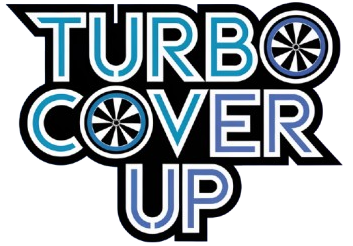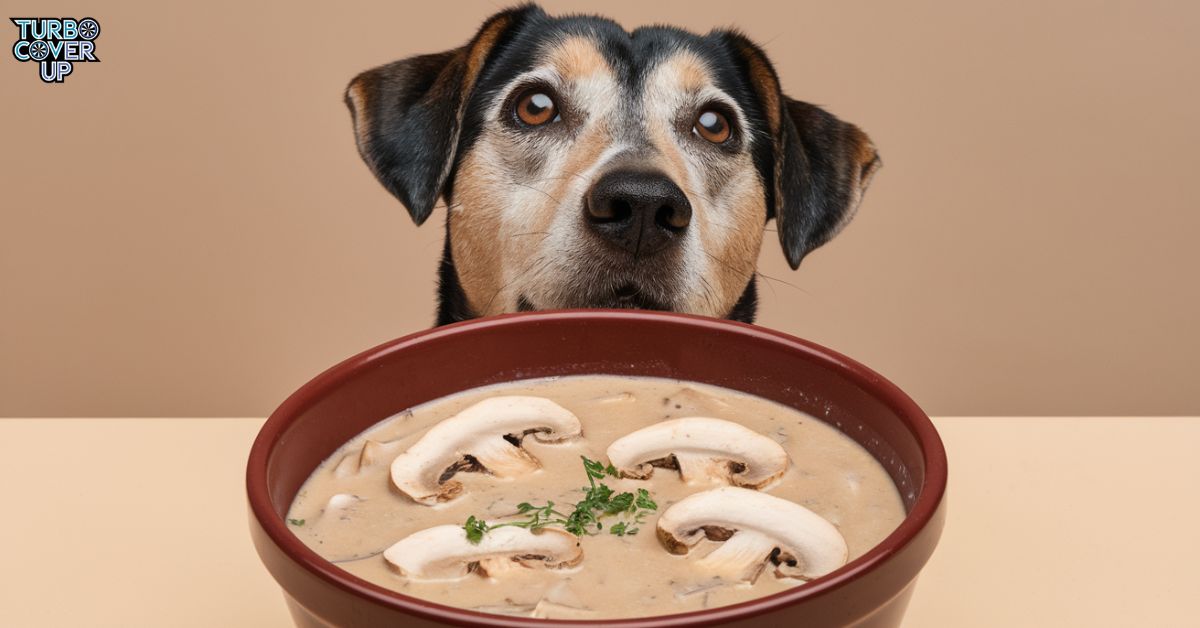Many people enjoy mushroom soup as a comforting dish, and naturally, they may wonder, can dogs eat cream of mushroom soup?
Dogs are often curious about human food, but what seems harmless to us can be dangerous for them. Cream of mushroom soup is one of those meals that dog owners need to be cautious about.
This article will explain why cream of mushroom soup may not be a safe choice for your pet and what alternatives you can offer instead.
Why Can Eating Cream Of Mushroom Soup Be Bad For Dogs?
Feeding your dog cream of mushroom soup may seem harmless, but it can harm your pet. Cream of mushroom soup contains high amounts of fat and sodium, which are both harmful to dogs. Dogs’ bodies aren’t designed to handle excessive fat intake or high sodium levels.
The fat intake from dairy can cause obesity or even lead to pancreatitis in some dogs. On top of that, the sodium content in cream of mushroom soup can lead to sodium-related complications, such as dehydration or kidney issues.
Additionally, cream of mushroom soup may contain toxic ingredients like onion and garlic, which are extremely harmful to dogs. These additives can cause onion or garlic poisoning, leading to serious health problems like anemia or digestive upset. Even small amounts of these toxic ingredients can make your dog sick.
Toxic Ingredients in Cream of Mushroom Soup for Dogs
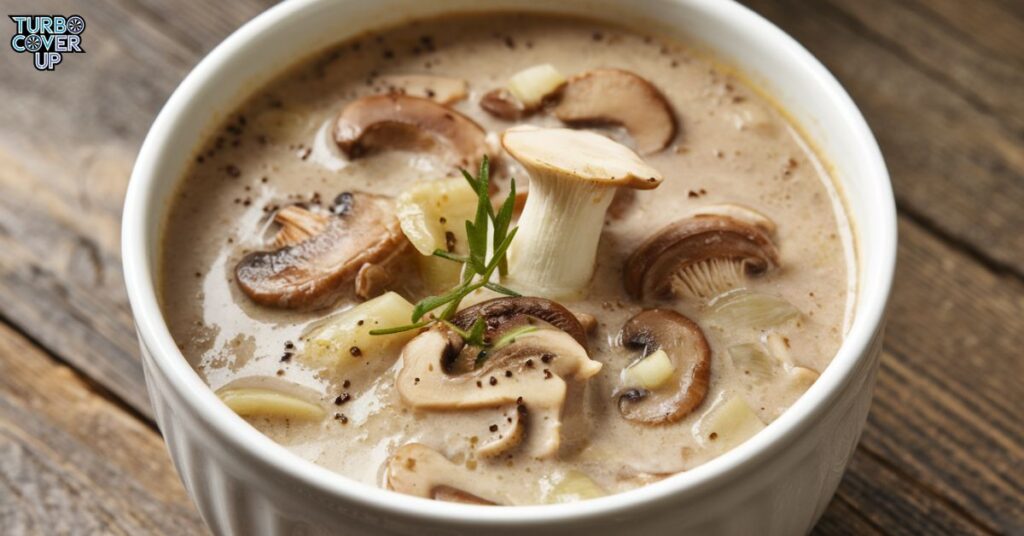
The biggest issue with cream of mushroom soup is that it often includes harmful additives. Onion and garlic are toxic to dogs and are commonly found in soups.
Even trace amounts can cause garlic poisoning, damaging your dog’s red blood cells and causing them to become weak or lethargic. These toxic additives can also cause vomiting, diarrhea, and other gastrointestinal issues.
Store-bought cream of mushroom soup often contains high sodium levels and preservatives. Sodium-related complications in dogs can include dehydration, increased thirst, and even high blood pressure.
The fat and sodium content of cream of mushroom soup poses another risk, as excessive fat intake can lead to obesity and pancreatitis.
Benefits of Mushrooms for Dogs
Mushrooms can be a great addition to a dog’s diet, as long as they are prepared correctly. The benefits of mushrooms for dogs are numerous, and they can help boost your dog’s immune system, improve digestion, and even provide extra nutrients.
Antioxidants found in mushrooms help protect dogs from oxidative stress and can reduce the risk of diseases like cancer. Additionally, mushrooms are rich in vitamins, including B vitamins, which help with energy and cell function. Mushrooms are also high in fiber, which aids in digestion and helps with regular bowel movements.
Mushrooms have also been found to contain adaptogens, which can help regulate stress in dogs. Polysaccharides are another benefit, as these compounds help support the immune system, making your dog more resistant to infections and illnesses.
Which Mushrooms Can Dogs Have?
Not all mushrooms are safe for dogs, but there are several types of safe mushrooms for dogs. The following table highlights mushrooms that can be included in a dog’s diet:
| Mushroom | Benefits |
| White Mushrooms | Common, easily available, and provide essential nutrients without the risk of toxicity. |
| Crimini | A bit more flavorful than white mushrooms, but equally safe and beneficial. |
| Portobello | Larger mushrooms that can be cooked plainly for dogs, offering high nutrient density. |
| Turkey Tail | Known for its immune-boosting properties, it can be a great addition to a dog’s diet in moderation. |
| Lion’s Mane | Helps improve cognitive function in aging dogs, making it a good choice for senior pets. |
| Chaga | Full of antioxidants, Chaga mushrooms are a good choice for promoting overall wellness in dogs. |
| Reishi | Reishi mushrooms are calming and can help reduce inflammation, making them suitable for dogs with arthritis or other inflammatory conditions. |
What Happens If Your Dog Ate Cream of Mushroom Soup?
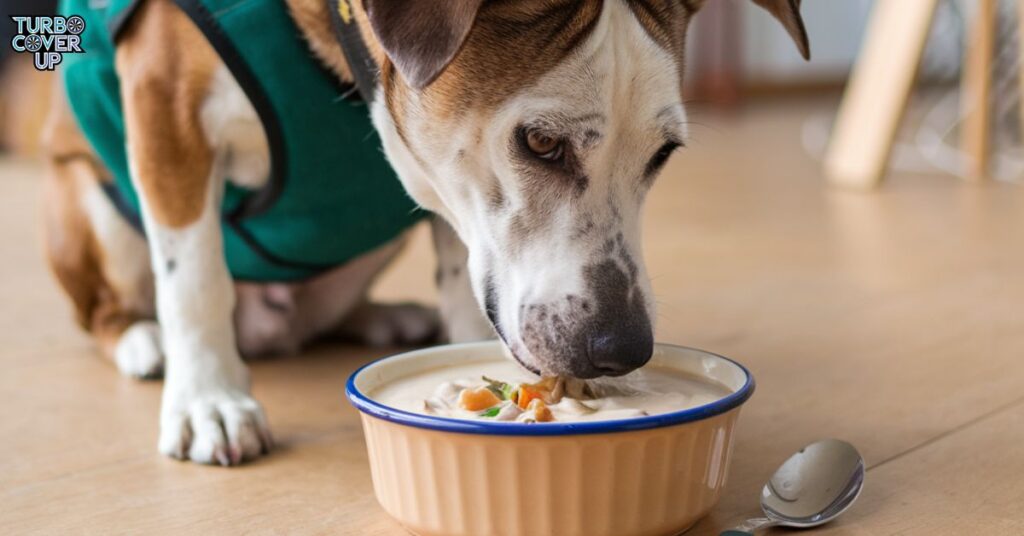
If your dog ate cream of mushroom soup, watch for signs of illness. Symptoms like vomiting, diarrhea, lethargy, or even more serious reactions such as trembling or drooling can occur.
These symptoms might indicate that your dog has ingested toxic ingredients like onions or is experiencing complications from high sodium levels. It’s crucial to contact your vet right away if you suspect onion or garlic poisoning.
Your vet will likely instruct you to bring your dog in for an exam, and treatments may include inducing vomiting or administering activated charcoal to prevent the body from absorbing toxins.
How to Feed Mushrooms to Your Dog
Feeding mushrooms to dogs requires a careful approach. You should avoid preparing mushrooms with butter, oil, or seasoning. Instead, stick to simple preparations like steaming or boiling. Start small, introducing mushrooms for dogs in tiny portions and monitoring how they react.
You can also consider dog-specific supplements that contain mushroom extracts. These supplements for dogs provide the benefits of mushrooms without the risk of feeding them harmful or toxic types. Capsules are another convenient option for pet owners looking to add mushrooms to their dog’s diet.
Which Mushrooms Are Toxic for Dogs?
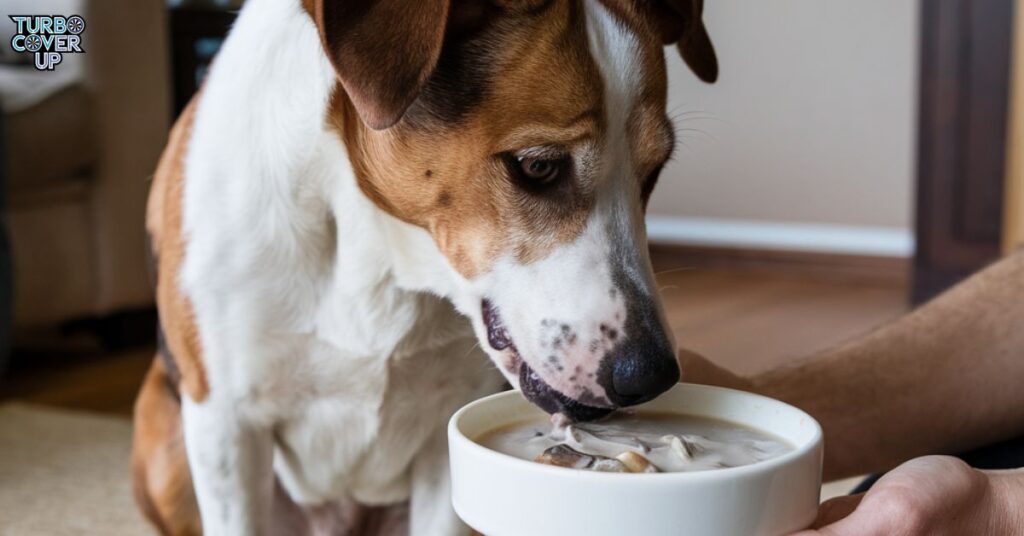
Not all mushrooms are safe for dogs. Some toxic mushrooms for dogs can cause serious illness or even death if ingested. Wild mushrooms are particularly dangerous, as it can be difficult to tell safe species from poisonous ones.
Mushrooms such as Amanita species, Death Caps, and False Morels should never be fed to dogs. These types can cause liver failure, seizures, and even death. If you’re ever unsure about whether a mushroom is safe for your dog, it’s best to avoid feeding it altogether.
Signs of Mushroom Toxicity in Dogs
If your dog has eaten a toxic mushroom, the symptoms can appear quickly.
- Vomiting
- Diarrhea
- Abdominal pain
- Excessive drooling
- Weakness or lethargy
- Tremors or seizures
- Jaundice (yellowing of gums or eyes)
- Confusion or disorientation
- Difficulty walking (ataxia)
- Increased thirst or urination
Safe Alternatives to Cream of Mushroom Soup
Instead of cream of mushroom soup, there are many safe alternatives you can offer your dog. Dog-friendly soups made with plain, unseasoned mushrooms can be a healthy and delicious treat.
You can make a homemade dog-friendly soup using ingredients that are safe for dogs. Skip the cream, butter, and seasonings, and focus on creating a broth made from safe mushrooms for dogs.
If you’re not comfortable preparing homemade soup recipes, you can also find specialized dog foods that include mushrooms as part of their ingredients. These options are designed to meet canine nutritional needs without the risks of harmful additives.
Final Words
While mushrooms can be a great addition to a dog’s diet, cream of mushroom soup is not a safe choice due to the toxic ingredients, high sodium levels, and excessive fat intake. Stick to safe mushrooms and dog-specific supplements to provide the benefits of mushrooms for dogs safely. Always consult with your vet before introducing new foods into your dog’s diet.
Frequently Asked Questions
Is cream of mushroom soup safe for dogs?
No, it contains harmful ingredients like onions, garlic, and excessive sodium that can be toxic to dogs.
Can dogs eat cream of mushroom soup?
No, dogs should avoid cream of mushroom soup due to its harmful additives and high fat content.
What are the potential dangers of feeding cream of mushroom soup to dogs?
The soup can cause garlic poisoning, sodium-related complications, and lead to obesity or pancreatitis in dogs.
Are there any health benefits for dogs in consuming cream of mushroom soup?
No, the risks from toxic ingredients outweigh any potential benefits mushrooms might offer.
What should I do if my dog accidentally ingests cream of mushroom soup?
Contact your vet immediately and monitor your dog for signs of toxicity like vomiting or weakness.
>>>Read more:
